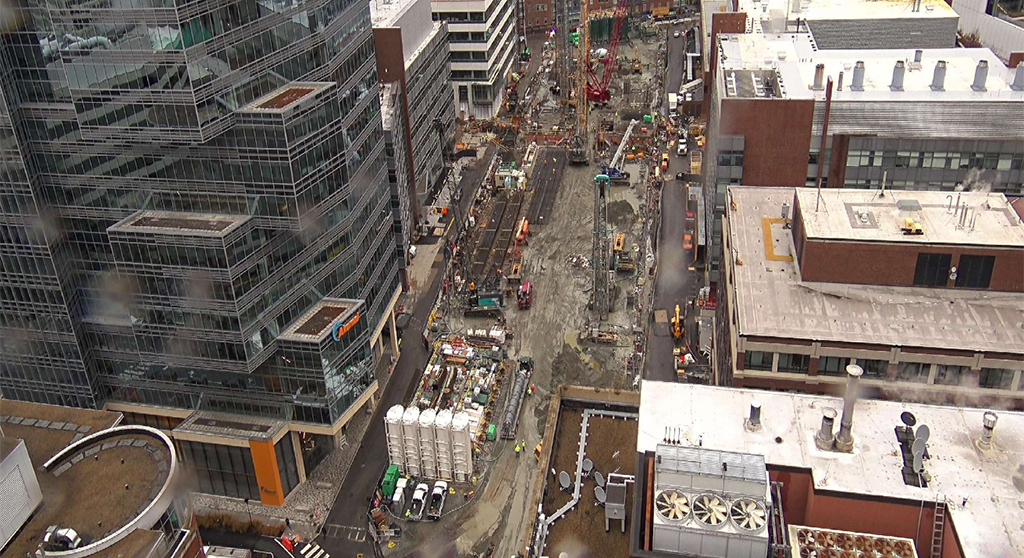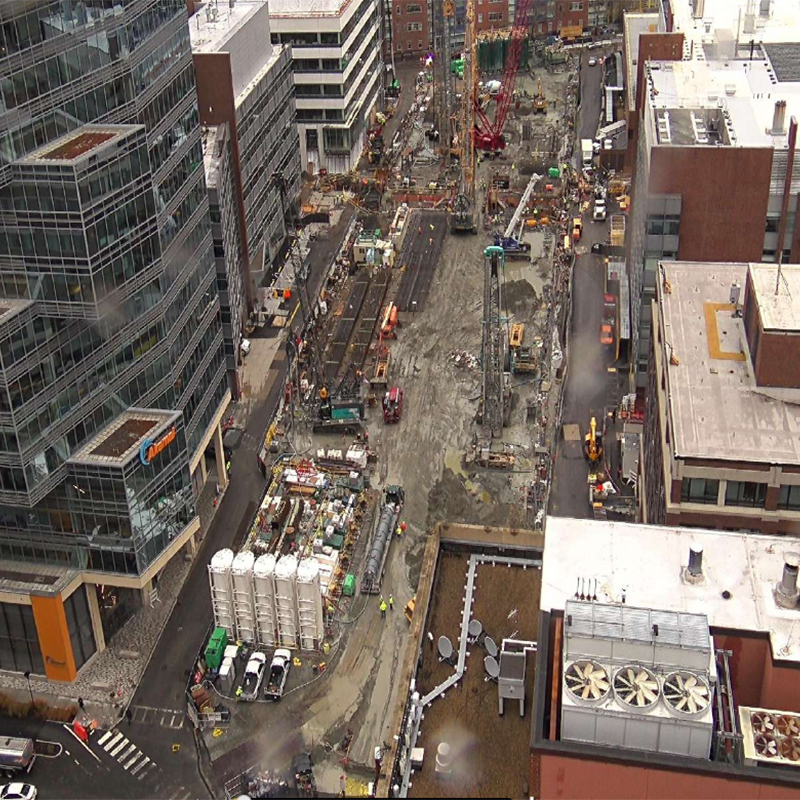Fight over vital power project is turning nastier with Eversource, MIT and city filings to board
The city and Eversource have rejected a compromise offered by the Massachusetts Institute of Technology on underground cable routes through the MIT campus for the utility’s huge transmission project in Cambridge, Somerville and Boston. That leaves the three players still in uncharacteristic disagreement over the project, which is intended to meet rapidly growing demand for electricity in the area.
In pointed statements filed Dec. 22 with the Energy Facilities Siting Board, which must approve the project, Eversource and MIT denounced each other’s positions even with the compromise. The school said Eversource had never evaluated its major alternate route, while Eversource claimed that the school’s assessment of the Eversource proposal was “myopic” because the university considered only “adverse impacts and risks to MIT.” Instead, the utility said, siting decisions must consider “a multitude of factors applicable to all residents and businesses in a community when developing routes in dense and congested environments such as Cambridge.”
Arguing for its proposal, MIT castigated the city for suggesting that it would not issue permits for street segments in the university’s proposal. The school said that it respects Cambridge’s right to advocate, but “allowing the city to use its permitting powers as a weapon to defeat a proposal it disfavors sets a very dangerous precedent.”
MIT cautioned Eversource about using the city’s stance as an argument against the university’s proposal. “Eversource’s tacit support of the city’s strategy is unwise since in future proceedings, a municipality that opposes the company’s proposal may use the same tactic against them,” the university said.
The city, meanwhile, reiterated its support for Eversource, saying nothing in MIT’s arguments overcame siting board standards. The project “is of critical importance to ensuring a reliable and sustainable energy supply in the face of growing electricity demands in Cambridge and to the transition to a carbon-neutral energy future for Cambridge,” the city said in a letter filed Dec. 22.
The dispute leaves the decision up to the siting board. But even before ruling on the overall project, the board must choose whether to give formal status to the MIT alternate proposal, as amended. A new formal alternate route from MIT would start a legal process that could delay the project at a time demand for electricity is growing rapidly and some parts of the Eversource transmission system in Cambridge are already operating beyond their capacity, according to Eversource.
First in the United States
Eversource wants to build a first-in-the-country underground electric substation stretching 11 stories underneath a site at 290 Binney St. in Kendall Square, with more than 8 miles of underground cable to connect it to existing substations in Cambridge, Somerville and Brighton. Eversource chose preferred routes for the cables after three years of consultation with local officials and others who would be affected, including MIT.
Then the institute surprised the parties by submitting a filing to the state Energy Facilities Siting Board rejecting the Eversource cable routes through its campus and proposing its own alternate routes, a few weeks before the siting board was to begin hearings on the project Oct. 16. In testimony before the board, which must approve the project, MIT’s experts said the Eversource routes along Vassar and Ames streets – the beating “heart” of the campus – would cause severe impacts, including disrupting students’ study and even disturbing research animals.
The university proposed alternate routes along the Grand Junction Railroad, Wadsworth Street and Albany Street. Then, in a Dec. 8 brief filed with the siting board, MIT offered a compromise: withdrawing its Wadsworth Street route and accepting Eversource’s Ames Street proposal if the utility agreed to mitigation measures. At the same time, the school said it could not agree with using Vassar Street as a route and said Eversource should adopt its alternate along the Grand Junction Railroad to Albany Street instead.
Doesn’t meet a threshold
Eversource and the city said they had already considered the segments included in the MIT proposal and rejected them. Cambridge Public Works commissioner Kathy Watkins said the MIT routes were “not viable” in testimony and suggested that the city would not grant permits for them. The City Council joined the battle by approving a resolution asking the school to withdraw its opposition to the Eversource plan.
MIT asserted that there was no evidence Eversource ever evaluated the Grand Junction Railroad route using its own scoring methods and said the railroad actually scored higher than Vassar Street, the street that the railroad route would replace.
Responding, Eversource said it did not score every proposed route if it “does not satisfy a threshold evaluation of viability.” The MIT proposal along the railroad didn’t meet the threshold, the utility said. Eversource has said it needs approval from the siting board by June to have the project operating by 2030, when it is needed urgently. The estimated construction cost is $1 billion. The cost to individual ratepayers is not known, but would total more than $2 billion as of 2029 over the 40-year life of the project after accounting for inflation and other adjustments, Eversource said in answer to questions from the siting board.





it would really be helpful to provide a link so that readers can get an objective understanding and not just advocacy for the City position. Truly MIT in this circumstance provides a very strong argument and justification for their position and recommended route. MIT postilion appears to be the safest and far less complicated route. . MIT recent filings simply ask that the Siting Board follow its long established procedures and rules and actually score and evaluate its proposed route. Note, the only cryptic support for the City promoted plan is from CRA and truly their letter of support evidences no understanding or even familiarity of the proposed routes. MIT recommendations provide for a simpler construction challenge and assert no real delay at all. Note, some of the docs are filed under seal and some even from the City.
Here is a link to the appropriate site for the docket: https://eeaonline.eea.state.ma.us/DPU/Fileroom/dockets/bynumber/EFSB22-03
No way MightyMouse. MIT has zero credibility in estimating the costs or saying what is “simpler” and “wouldn’t cause delays”, because they are not the ones that are building power lines.
By doing this last-minute they have no benefit of the doubt that they are operating in good faith, seems more like a stalling action that hurts the City. Obviously they are self-motivated unlike the utility, I doubt Eversource wants to spend more just so they can stick it to MIT …
Best reading is that MIT would like to keep this in review and arguing scoring methodologies until it is finished building its two (maybe more?) major building projects on Vassar, so they can lay their lines there and not Eversource. It’s obvious that returning to a design phase would result in delays, idk how you could suggest that there would be “no real delays”.